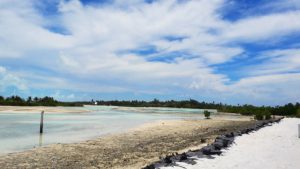Tarawa, Kiribati (May 14, 2018) – To support the Government of Kiribati in their effort to increase their accessibility to global climate change and disaster risk finance, a national consultation was undertaken between 27 April and 4 May, in Tarawa, with representatives from government ministries, donor partners, private sector, and non-governmental organisations.
In partnership with Kiribati’s Ministry of Finance and Economic Development and the Office of the President, a joint assessment team led by the Pacific Islands Forum Secretariat (PIFS), with the USAID/SPC Institutional Strengthening in Pacific Islands Countries to Adapt to Climate Change (ISACC) Project, the USAID Climate Ready Project, the DFAT/GIZ Climate Finance Readiness in the Pacific Project, the Asian Development Bank, and the World Bank PROP Ocean Finance Program conducted a national workshop on Monday 30 April, followed by bilateral consultations from Tuesday 1 May to Friday 4 May, using the Pacific Climate Change Finance Assessment Framework. Kiribati is the tenth Pacific Island Country to undergo a national climate change and disaster risk finance assessment.
Opening the Introductory Workshop, Deputy Secretary for the Ministry of Finance and Economic Development, Ms Tebantaake Keariki, stressed the importance of ensuring that the climate change and disaster risk finance assessment report has utility for the Government of Kiribati, and complements the recent reforms being undertaken to strengthen national systems and processes for accessing and managing climate and disaster risk finance.
“The Government of Kiribati prioritizes its accessibility to climate change finance in line with the objectives of the Kiribati Vision 2020 (KV20) and the Kiribati Development Plan (KDP). This is demonstrated with the recent establishment of a Climate Finance Division within the Ministry of Finance and Economic Development, specifically tasked to facilitate access to the Green Climate Fund, the Adaptation Fund, and the Climate Investment Fund”, said Deputy Secretary Keariki.
Ms Saitofi Mika, Secretary for the Ministry of Finance and Economic Development, added that the assessment is timely to support the work of the new Climate Finance Division and to inform the upcoming consultations under the Green Climate Fund (GCF) readiness program to develop Kiribati’s Strategic Framework for engaging with the GCF. Ms Mika also emphasized the need for the report to have a costed Action Plan so that it is easier for the Government to track and utilize during a discussion with development partners.
The Secretary for the Office of the President, Ms Maryanne Mikaere Namakin, reaffirmed the importance of the assessment to enhance the coordination role of the Kiribati National Expert Group on Climate Change and Disaster Risk Management, clarify roles and responsibilities of respective agencies, and inform the draft Climate Change Policy and the review of the Kiribati Joint Implementation Plan for Climate Change and Disaster Risk Management.
The assessment report and recommendations will identify opportunities to develop or update relevant policies and plans, strengthen human capacity and public financial management systems, enhance institutional coordination and ensure that cross-cutting issues like gender and social inclusion are mainstreamed and supported.
The results will be of benefit not only to support improved and direct access to international climate finances, but they will also enhance donor confidence and utilization of country systems.

